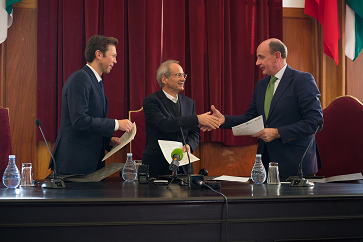The second phase of the Atlantic Romanesque Plan in Boticas and Guimarães kicks off
Fundación Iberdrola España, the Portuguese Ministry of Culture and the public authorities in Boticas and Guimarães have signed a cooperation agreement to restore the Romanesque churches in Covas de Barroso (Boticas) and Serzedelo (Guimarães) in northern Portugal.

60,000 euros will be earmarked for the restoration of the Covas del Barroso church in Boticas and the remaining 120,000 euros for the refurbishing of the Serzedelo church in Guimarães.
This collaboration is part of the Atlantic Romanesque Plan, an initiative that began in 2010 to accompany Iberdrola’s River Tâmega hydroelectric project, the largest infrastructure project of this type carried out in Europe in the last 25 years.
The Atlantic Romanesque Restoration Plan essentially seeks to preserve, restore and enhance heritage sites while laying the foundation for sustainable regional growth and development by creating jobs, boosting social and economic development, promoting tourism and redistributing investments among the rural towns within its scope of action.
Fundación Iberdrola España, the Portuguese Ministry of Culture and the Boticas and Guimarães city councils will invest a total of 180,000 euros in the second phase of this project. Of this, 60,000 euros will be earmarked for the restoration of the Covas del Barroso church in Boticas and the remaining 120,000 euros for the refurbishing of the Serzedelo church in Guimarães.
The Atlantic Romanesque Restoration Plan is a cross-border cooperation project for the Conservation of Cultural Heritage and it includes restoration projects involving a score of Romanesque churches in the Spanish provinces of Zamora and Salamanca and the Portuguese regions of Porto, Vila-Real and Bragança.
There has been close collaboration between the different entities in Spain and Portugal since 2010, in particular between the Castilla y León regional government’s Ministry of Culture and Tourism, the Portuguese Secretary of State for Tourism, Iberdrola Spain, the Catholic Church in Portugal and the Spanish dioceses of Ciudad Rodrigo, Salamanca, Zamora and Astorga.
With an overall budget of €4.5 million, the Plan has been promoting cultural diffusion since 2015 along with the development of new management models for the cultural and economic revitalisation of the areas involved. The programme is scheduled to continue until 2018.
